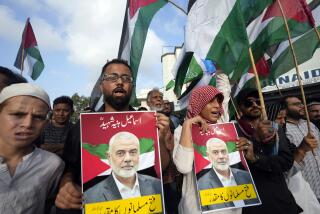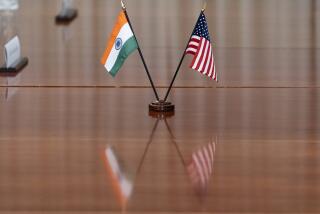U.S. Weighs Implications of ‘Tragedy’
- Share via
WASHINGTON — President Bush called the assassination of Rajiv Gandhi an “appalling” tragedy Tuesday as U.S. officials tried to sort out the implications of India’s devastating political violence on U.S. policy toward the subcontinent.
“I don’t know what the world’s coming to, but it’s a sad thing for this young man to have lost his life in this way,” Bush said. “That people resort in a democratic country or anywhere to violence of this nature is just appalling.”
Gandhi’s death comes at a time when U.S. officials have been quietly pleased that India’s always enormous problems appeared to be easing. Although internal violence has been severe for months, the United States and the Soviet Union had succeeded over the last year in defusing the threat of war between India and Pakistan over the disputed territory of Kashmir.
And officials had hoped that the current election might end a period of political stalemate that has given India a succession of weak governments.
Now, Administration officials and non-governmental experts fear, the assassination of the country’s leading candidate for prime minister, a position he held once before, could throw India into chaos.
“We’ve sort of taken Indian stability for granted for 45 years,” said Peter Galbraith of the Senate Foreign Relations Committee staff. “This is a testing time for that stability.”
“The main concern is that the assassination could lead to more sectarian violence,” an Administration official said. “We have to know who committed the act and why” to have a clear idea of the implications, he added, “but whoever did it, it clearly is not good for Indian democracy.”
The fear of a new wave of violence among India’s warring sects, nationalities and castes draws on the experience of seven years ago, when murderous rampages broke out against Sikhs after Gandhi’s mother, Prime Minister Indira Gandhi, was killed by her Sikh bodyguards.
In addition, officials noted, the past year already has been extremely violent, with battles between Muslims and Hindu fundamentalists across the country, the secessionist struggle by Sikhs in the Punjab in the northwest and by Kashmiri nationalists in the north, and incidents of terror by Tamil nationalists in the south.
During the current election, in which voting began Monday, at least 81 people have been killed in election-related incidents, Indian authorities report. At least 110 were killed during the campaign.
Also, officials and non-governmental experts on India agreed, without Gandhi, there is no assurance that his Congress-I party can coalesce around a leader.
“It’s not clear what is going to happen with the Congress party,” the Administration official said. “That’s one of the immediate concerns--who will step in.”
And although U.S. officials long have worried about corruption within Congress-I and its resistance to changing India’s highly bureaucratic economy, they have seen little evidence, they said, that any other party or coalition of parties would be capable of providing a strong central government for the world’s largest democracy.
Unfortunately, the officials added, neither the United States nor its allies can do much at this point to forestall instability in India; American officials are able to do little more than express their sorrow at Gandhi’s death and their hopes that Indian democracy can survive him.
Bush led the chorus of mourners.
“Barbara and I have had a friendship, a real friendship, with Rajiv Gandhi and his wife, and on a personal basis I mourn the loss,” the President said to reporters after a meeting with President Luis Alberto Lacalle of Uruguay.
Times staff writer Robin Wright contributed to this report.
More to Read
Sign up for Essential California
The most important California stories and recommendations in your inbox every morning.
You may occasionally receive promotional content from the Los Angeles Times.














